Bibi bound for US but Australia trip still planned
AFTER less than 48 hours in his new job, Donald Trump rushed to invite Israel’s Prime Minister to the White House.
AFTER less than 48 hours in his new job, Donald Trump rushed to invite Israel’s Prime Minister to the White House.
Benjamin Netanyahu is expected to fly to Washington within a fortnight, making him one of President Trump’s first international visitors.
Sources in Jerusalem tell The AJN that there is no truth in rumours that this will cause Netanyahu to cancel a visit to Australia later in February. “The trip is going ahead as scheduled,” a government official said.
Netanyahu is expected to spend several days in Sydney and a day in Melbourne – unless other factors beyond his control have grounded him in Israel by then.
He is under investigation by police in two cases, one of them to do with allegedly receiving gifts from businessmen and another to do with allegedly trying to cut a deal with a newspaper publisher to get more favourable coverage if he used his power to boost its distribution.
Officers are now nearly ready to transfer investigation material to the prosecution, according to police chief Roni Alsheich, and will do so within a “few weeks”. If the scandal escalates, forcing the Prime Minister into crisis mode, or if legal steps are taken, it could stop him from travelling.
But Netanyahu is denying any wrongdoing, maintaining a -business-as-usual approach, and savouring the change in atmosphere with the Oval Office signalled by Trump’s early invitation. Trump’s predecessor Barack Obama made it famously difficult for Netanyahu to fix meetings, and once reportedly abandoned him in a White House meeting room “to have dinner with Michelle and the girls”.
While Trump’s precise Israel policies remain unknown, it’s clear that he doesn’t have the same personal distaste for Bibi. In fact, Trump endorsed him ahead of Israel’s 2013 general election, calling him a “terrific guy, terrific leader, great for Israel”.
On Sunday, the second full day of Trump’s administration, he talked to Netanyahu by phone. Trump promised “unprecedented commitment to Israel’s security” and Netanyahu described the exchange as “very warm”.
Netanyahu’s office was upbeat after the phone call, saying that he “expressed his desire to work closely with President Trump to forge a common vision to advance peace and security in the region, with no daylight between the United States and Israel”. It said that the two men discussed the West’s nuclear deal with Iran, the peace process with the Palestinians, and other issues.
Trump has ties in Israel’s settler right, and several settler leaders, including Oded Revivi who holds the foreign affairs portfolio for the main settler organisation the Yesha Council, attended the inauguration last week. Two Knesset members, Yehudah Glick and Sharren Haskel, also attended, hosted by a Christian ministry.
In Hayovel, the ministry that invited them, and at the celebratory balls and prayer rallies they attended, these politicians from the right flank of Likud enjoyed meetings of minds. “We hope there can be a change,” Hayovel spokeswoman Lydia Taylor told The AJN, referring to the start of Trump’s presidency. “We don’t believe that the two-state solution is the option for peace.” Rather, they think that the West Bank should be considered “part of Israel” – and hope that Trump will agree.
As Revivi, Glick, Haskel and others were celebrating Trump’s rise, hundreds of Israeli left-wingers were demonstrating. They rallied outside the US embassy in Tel Aviv in -solidarity with the anti-Trump Women’s March on Washington. The Tel Aviv demonstrators waved banners that protested Trump’s attitude towards women and his political views.
On the Israeli right, as in American ministries like Hayovel, hopes are high that the Trump era will mean concrete results for building beyond the Green Line – quite literally, with Israel boosting construction and tightening its control in the West Bank and East Jerusalem.
Aside from this long-term aim, Israeli rightists are holding their breath for a more symbolic victory: the relocation of the US embassy. The Trump campaign said it wants to move the embassy from Tel Aviv to Jerusalem – and the new President told the Israel Hayom newspaper last week that he remembers his pledge and is a man of his word.
Jerusalem’s mayor Nir Barkat is so keen to see this happen that he has released a video to drum up excitement among the “entire spectrum” of the Israeli public for the move. A relocation would “send a clear message to the world that Jerusalem is the united capital of the State of Israel”, Barkat said.
On Monday White House Press Secretary Sean Spicer indicated that the issue is under discussion, but that it may or may not actually happen, saying that Trump’s team is in the “early stages of the decision-making process”.
Even the start of discussions in the White House has been enough to set off a frenzy among Palestinians and their allies, and the Jordanian and Palestinian Authority leaderships met this week to talk about the issue. Hayel Dawood, a Jordanian minister, said after the meeting that relocation of the embassy would be “a dangerous development that requires an offensive position against it”.
Barkat’s call to the Israeli public is a move to counter the pressure that will be brought on Trump to scrap the relocation plan. He called it “a reaction to our enemies who are trying to prevent the move of the embassy and wish us ill”.
NATHAN JEFFAY


comments